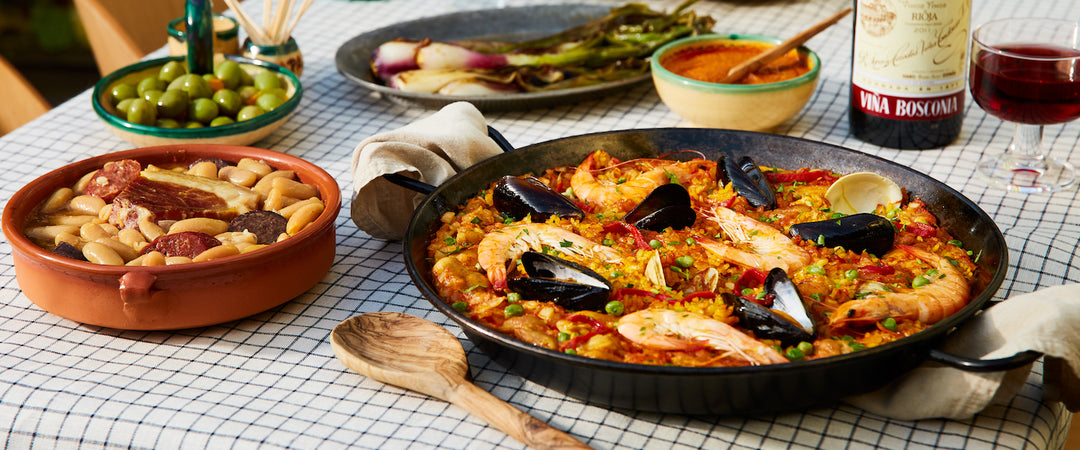The Rich Diversity of Iberian Peninsula Wines
Wines from the Iberian peninsula offer amazing variety. There is a Spanish or Portuguese wine for every mood and every food. In this short article, we give a brief overview of them all to answer the most common questions. Whether you love red or white, let us guide you to a Spanish or Portuguese wine you like.
When you venture into the world of wines from the Iberian Peninsula, which encompasses the wine-producing regions of Spain and Portugal, you're embarking on a fascinating journey through a landscape as diverse and storied as the cultures themselves. Both countries offer a treasure trove of wine varieties, each with its own distinct character, shaped by the unique climates, soils, and winemaking traditions of the region. Let's navigate through the key differences between the wines from this enchanting region, much like a trusted friend guiding you through their personal wine cellar.
White Wines: A Refreshing Voyage
White wines from the Iberian Peninsula are as varied as the regions from which they hail. Portugal's Vinho Verde, with its light, refreshing, and slightly effervescent nature, contrasts sharply with the complex, fuller-bodied whites like Alvarinho from the same country. Further south, in Portugal's Bairrada, whites are made from the Baga grape, which has bracing minerality alongside warm white stone fruit. Moving even further south, many easy drinking but high quality white wines are made in the Alentejo region. Spain's answer to diverse white wine offerings includes the crisp and aromatic Albariño from Rías Baixas, and the rich, oaky whites of Rioja, made primarily from the Viura grape. But these these are just the acts on the main stage. There are many other regions that offer greatness. The northwestern region of Bierzo produces stunning whites, both fruit forward and lees-aged wines based on the Godello and Dona Blanca grapes. Go to Spain and order a "blanco", you will most often get a Verdejo from Rueda. These, too, can either be simple, youthful fruit-forward everyday wines, or they can be old-vine, oak aged whites that rival top Chablis. Go to the Penedes and you find both still and sparkling wines based on Xarelo and Macabeo that are both fruit forward and infused with minerality from lean limestone soils prevalent in the region. And, as if we didn't have enough to explore, the white wine fun doesn't end there. The islands of Mallorca in the Mediterranean offers a wide variety of white and red wines from local varietals grown in temperate island climates and soils. Here, you might find Malvasia and exotics like Giro Ros or Prensal. If we go offshore to the east of Spain, we find an equally exotic way of growing grapes and making wine in the Canary Islands (Tenerife, Lanzarote), where volcanic soils and very unique oceanic microclimate produce stunningly different white wines with volcanic flavor and oceanic freshness.
What sets these Iberian white wines apart is not just their flavor profiles, which can range from zesty citrus to lush peach and apricot notes, but also their versatility. These wines pair beautifully with a wide range of foods, from seafood and salads to cheese and white meats. They're crafted with a keen attention to the balance between acidity and fruitiness, making them not just refreshing, but also complex and engaging to the palate. And, just like the Iberian cuisine, they offer something for every palate.
Iberian Red Wines: A Dive into Richness And Innovation
Moving on to the reds, the Iberian Peninsula is home to some of the most robust, deeply flavored wines in the world. Spain's Tempranillo, the backbone of the renowned Rioja and Ribera del Duero wines, offers flavors of plum, tobacco, and leather, often aged in oak to add complexity and smoothness. Portugal's answer to red wine excellence is embodied in its Touriga Nacional, a grape that produces concentrated, tannic wines with dark fruit flavors, often used in the blend for Port but also increasingly celebrated in still red wines.
Red wines from the Iberian Peninsula are most well-known for their depth, structure, and higher tannin content which allows many Spanish wines to age gracefully. They are wines that demand attention, perfect for savoring with hearty meals, including red meats, game, and rich, flavorful cheeses. But aside from the bold reds that have maybe made Spain famous, there are many more subtle, nuanced wines Spain has to offer. The Garnacha grape can take on very light expressions in the leaner high altitude soils of Sierra de Gredos or on the coast of Catalonia. Mencia in the cool northwest of Spain can at times be bold, at times be light, aloof, with acid driven minerality.
The art of winemaking in both Spain and Portugal respects the bold characteristics of some of these red grapes, often employing traditional methods to enhance their natural richness and complexity. But Spanish winemakers are also among the worlds most innovative. The innovation spans from high-tech chilled sorting rooms in modern Rioja on the one hand, all the way to having re-embraced ancient and forgotten winemaking techniques like aging in amphorae, native yeast fermentation, and low-intervention winemaking in smaller estates.
A Shared Heritage, Distinct Paths
While both Spain and Portugal share the Iberian Peninsula and a deep-rooted wine-making heritage, the differences in all of its wines reflect the diversity of their landscapes, climates, and cultures. White wines from the peninsula can be as light and breezy or as complex and textured as the regions they come from, while the reds offer a journey through flavors that are bold, nuanced, and incredibly satisfying.As you explore these wines, remember that each bottle tells a story of its origin, the care with which it was crafted, and the traditions it upholds. Whether you lean towards the refreshing whites or the rich reds, or all the fun subtleties in between, wines from the Iberian Peninsula offer a delightful exploration of taste and tradition, inviting you to discover the nuances that set them apart and the craftsmanship that brings them to life. Cheers to your journey through the vibrant world of Iberian wines!



